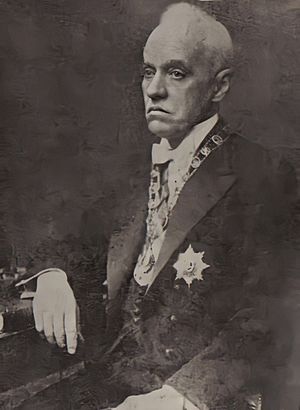Juan Bautista Pérez facts for kids
Quick facts for kids
Juan Bautista Pérez
|
|
|---|---|
 |
|
| President of Venezuela | |
| In office 30 May 1929 – 13 June 1931 |
|
| Preceded by | Juan Vicente Gómez |
| Succeeded by | Juan Vicente Gómez |
| Personal details | |
| Born | 20 December 1869 Caracas, Venezuela |
| Died | 7 May 1952 (aged 82) Caracas, Venezuela |
| Alma mater | Central University of Venezuela |
| Signature | |
Juan Bautista Pérez (born December 20, 1869 – died May 7, 1952) was a Venezuelan lawyer and politician. He served as the President of Venezuela from 1929 to 1931. Even though he was president, Juan Vicente Gómez was still the most powerful person in the country. After his time as president, Pérez became Venezuela's Ambassador to Spain.
Early Life and Career
Juan Bautista Pérez studied law at the Central University of Venezuela. He finished his studies around 1895. After becoming a lawyer, he worked in a town called Villa de Cura.
In 1900, he moved back to Caracas. There, he started working as a judge. He slowly moved up in the legal system. Eventually, he became the head of the highest court in Venezuela, called the Federal Court and Cassation, in 1929.
Becoming President
In 1929, General Juan Vicente Gómez was the country's leader. He had been president for a long time. Gómez decided he wanted to step down as president. However, he still wanted to control the country from behind the scenes. He would remain the commander of the army.
When Gómez was re-elected president in April 1929, he suggested that Juan Bautista Pérez take the job instead. Pérez was already in charge of the presidency temporarily. This was because he was the head of the highest court. So, on May 30, 1929, Juan Bautista Pérez officially became the President of Venezuela.
Time as President
As president, Juan Bautista Pérez made some important decisions. One of his first actions was to sign an official order. This order led to a disagreement with the church. A bishop named Monsignor Salvador Montes de Oca was asked to leave the country. This caused a public argument with church leaders in Venezuela.
In 1930, President Pérez achieved something big for Venezuela. He managed to pay off all of Venezuela's foreign debt. This meant the country no longer owed money to other countries.
However, Pérez's time as president was not easy. The world was going through a major economic crisis. This made Venezuela's economy weaker. In June 1931, the National Congress blamed Pérez for the country's economic problems. He was also accused of allowing new ideas, like communism, into the country. These accusations were part of a plan by other politicians. They wanted to replace Pérez with someone else.
Because of this pressure, Pérez had to resign from his position on June 13, 1931. Even though some people wanted to be president, Juan Vicente Gómez was re-elected. He gained even more official powers. After leaving the presidency, Juan Bautista Pérez became Venezuela's ambassador. He served as ambassador to Spain and Portugal from 1931 to 1933.
After the Presidency
After his time as ambassador, Juan Bautista Pérez returned to Venezuela. However, in 1936, his house was searched. He and his family were forced to leave the country.
He lived in Barcelona, Spain, for a short time. When the Spanish Civil War started in July 1936, he moved to Paris, France. In 1939, he was able to return to Venezuela. Some of his property had been taken away in 1945. But in 1949, it was given back to him.
See also
 In Spanish: Juan Bautista Pérez para niños
In Spanish: Juan Bautista Pérez para niños
 | Kyle Baker |
 | Joseph Yoakum |
 | Laura Wheeler Waring |
 | Henry Ossawa Tanner |

